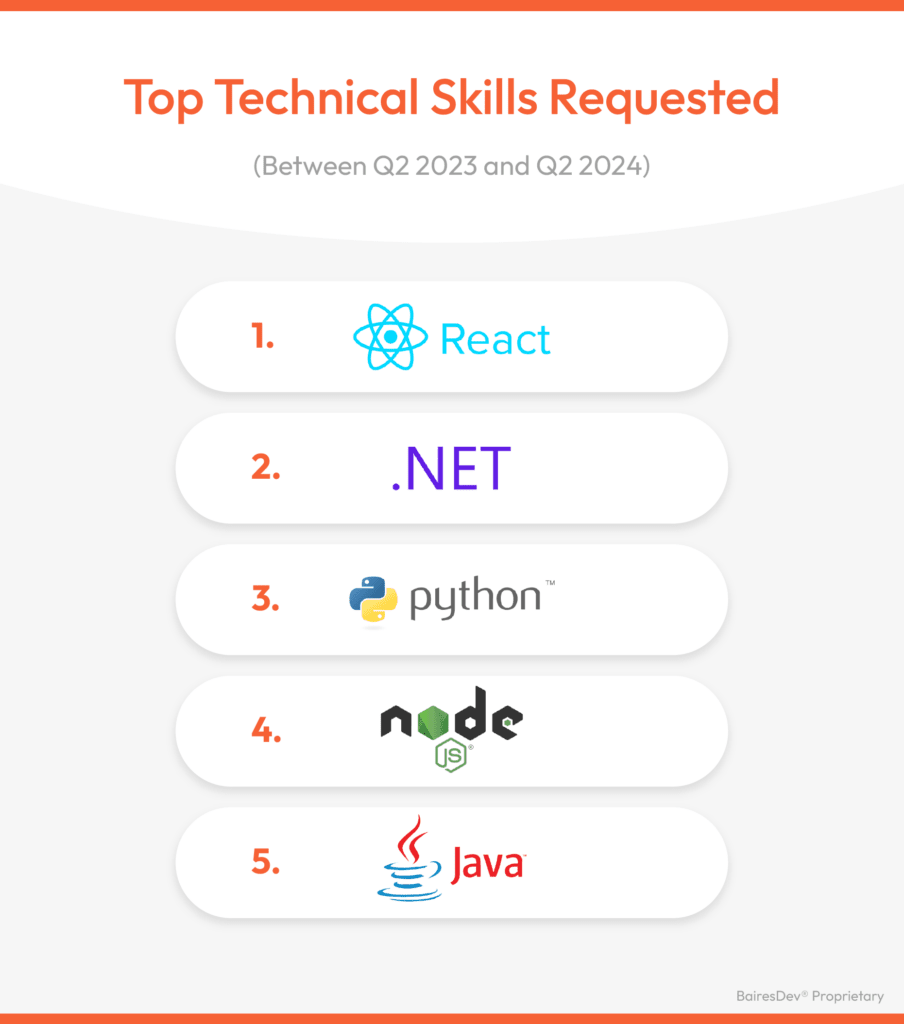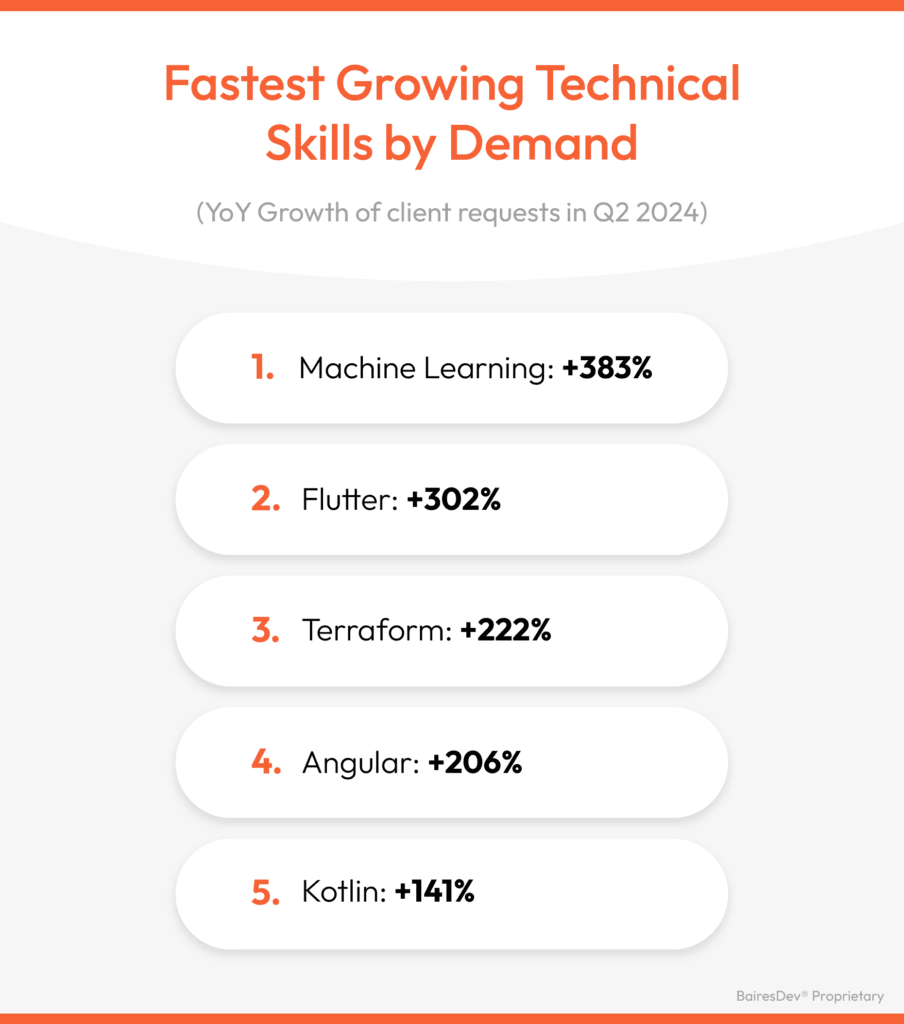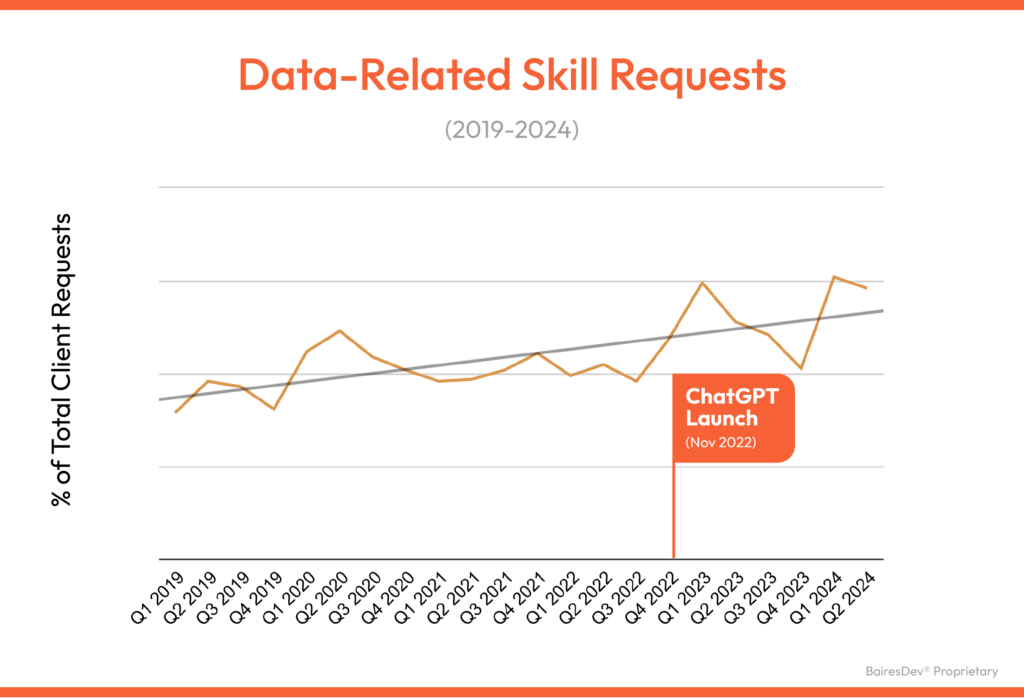Artificial intelligence (AI) may be grabbing the headlines, but core tech skills are doing the heavy lifting behind the scenes. A BairesDev analysis of skill requests from 500+ clients, ranging from startups to Fortune 100 companies, showed that these core technologies are the backbone of most projects—AI included.
Key Takeaways:
- Core Tech Skills Still Dominate Demand: React, .NET, Python, Node, and Java remain the most requested skills, powering the majority of full-stack software projects, including AI-driven systems.
- AI and Core Skills Overlap: As AI grows, demand for versatile core skills like React and Python increases, proving that AI development relies heavily on a strong technical foundation.
- Data Skills and Infrastructure Are Key to AI Success: Demand for data-related technical skills has increased by 77% since 2019. These skills are crucial for creating the robust data ecosystems that power AI innovation.
Core Tech Skills as the Backbone of AI Projects
In 2024, we are seeing companies request technical skills in core technologies for full-stack development. But, as AI expands, the overlap with core technical skills grows.

These core technologies power the majority of full-stack software development projects, including AI projects.
- React: Dominates the front-end development scene with its ability to create dynamic and responsive user interfaces. It simplifies the creation of interactive front-end interfaces for AI applications, ensuring intuitive user experiences.
- .NET: Frequently used in enterprise-level applications, e-commerce platforms, and robust backend systems. Commonly used for AI tools within enterprise ecosystems, especially where secure and structured AI models are necessary.
- Python: A versatile language essential for web development, data analysis, automation, and AI. It has the ability to efficiently process data into usable formats. It is essential for AI tasks, from training machine learning models to handling data processing and pipeline management.
- Node: Powers high-performance, scalable network applications, and real-time services. It is key in handling high-volume API requests ensuring efficient and responsive AI systems.
- Java: The go-to language for building large-scale enterprise applications, Android apps, and backend systems. Its robustness allows for complex AI solutions, such as integrating AI into large-scale enterprise platforms, providing the necessary stability for business-critical operations.
The Core Tech Skills Behind AI Innovations
Core tech skills are the foundation of many AI innovations, showing their critical role in the backend and real-time processing needed for successful AI applications. Some examples include:
- Using React, we built a front-end user interface for an AI algorithm repository used to deliver solutions that recognized facial expressions, object images, feelings, and language patterns.
- With Python, we built a Gen-AI Beta App to extract information from legal documents. The goal was to reduce the back-and-forth between legal experts by providing a tool that accurately answers questions related to specific documents.
- Using Node, we helped one of the world’s largest freight companies improve its delivery platform. Our developers integrated AI capabilities so users can receive real-time information on weather, traffic, and warehouse capacity.
- We’ve leveraged Java and .NET to develop an AI tool that summarizes extensive transcripts of 200–300 pages. The tool currently summarizes 10,000 legal transcripts per day and ensures transcripts are anonymous, by removing names and identifiable information from summaries.
This overlap highlights the synergy between core skills and AI technologies. Even AI companies like OpenAI and Anthropic rely on core technologies to power key aspects of their platforms. For instance, OpenAI leverages Python extensively in the development of its machine learning models, such as GPT, for tasks ranging from training neural networks to processing massive datasets. Similarly, Anthropic uses Node to handle real-time API requests, ensuring that its AI systems can deliver responses with minimal latency, which is crucial for applications like conversational AI.
The Rise of AI and Machine Learning Tools
While core tech skills are the foundation, the demand for AI-technical skills is rapidly increasing. Machine learning is the fastest-growing skill in 2024, followed by Angular, Flutter, Kotlin, and Terraform.

While machine learning is widely understood to be a component of AI, the other skills are also linked to the rise of AI:
- Front-end frameworks like Angular often build interfaces for AI applications. We often use Angular to develop desktop and mobile applications meant for a consumer audience.
- Flutter and Kotlin facilitate the integration of machine learning features into mobile apps. In our engagement with one of the world’s largest freight companies, we used Kotlin to develop a mobile app that provides competitive delivery times to retailers of all sizes. We integrated AI capabilities into the app to provide users with real-time information on weather, traffic, and warehouse capacity.
- Machine learning models require safe and reliable infrastructure, which Terraform provides. We recently worked with a client that personalizes the discovery experience by using AI to analyze user intent. We implemented scalable backend systems and APIs for the client’s AI platform. Through Terraform, our team streamlined infrastructure provisioning with automation.
Data, the Pickaxe of the AI Gold Rush
Data is foundational for AI. It relies heavily on well-maintained data ecosystems, making data infrastructure a critical element in its development. In Q1 2019, these requests represented only 7.9%. Now they represent over 14% of all client requests, indicating a 77% increase.

Over the past five years, we’ve seen a steady, and sometimes steep increase in demand for developers who specialize in tools like Snowflake, MongoDB, and Databricks, among others. If AI is a gold rush and you’re a developer, you might want to be selling the pickaxes. In this case, the pickaxes are skills related to data because a well-maintained data infrastructure is the engine that drives a successful AI product.
Balancing Emerging Trends with Traditional Technologies
Our research paints a picture of a tech landscape where business as usual prevails at first sight. Core tech skills like React, .NET, Python, Node, and Java continue to be indispensable, driving both AI and non-AI projects.
According to recent Gartner research, at least 30% of generative AI projects are predicted to be abandoned after the proof of concept by the end of 2025. This is primarily due to challenges such as poor data quality, inadequate risk controls, escalating costs, and unclear business value. The increasing interest in AI and machine learning underscores the need for data-related skills to capitalize on AI’s potential.
The tech world remains diverse and multifaceted, with evolving demands that reflect both enduring staples and emerging trends. For businesses looking to capitalize on AI, the key lies in a balanced approach. Leveraging both core tech skills and AI expertise is essential for sustainable success in today’s competitive tech landscape.
For more insights or to explore how our skilled developers can help your business thrive, contact BairesDev.






